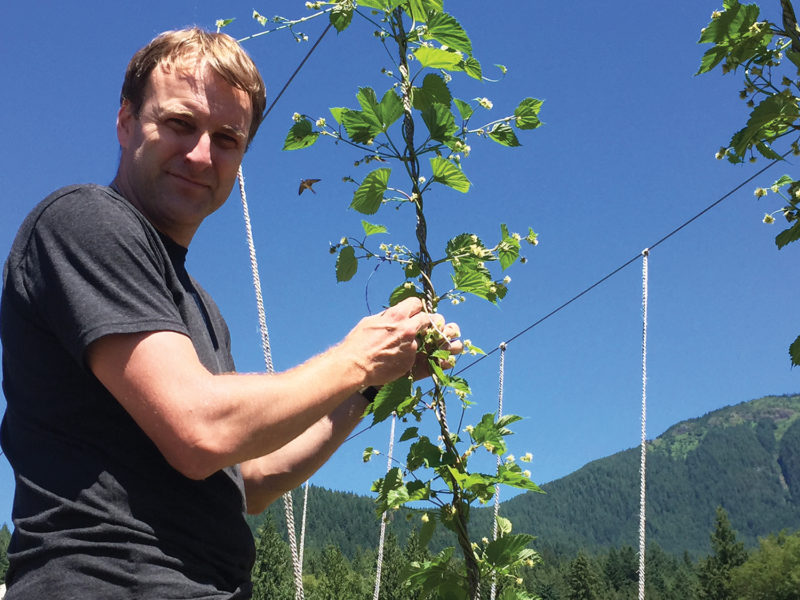SURREY – The expansion of a life sciences lab at Kwantlen Polytechnic University in Surrey this spring will deliver a boost to cutting-edge agricultural research in the Fraser Valley.
KPU’s existing Applied Genomics Centre offers 750 square feet of space for various research projects focused on genetics, including a hops development program.
“One thing we found is that if you look across British Columbia, there’s not a lot of universities that are focused on agriculture. Most are focused on human health, for good reason,” says centre director Paul Adams, who identified the farm sector as a distinctive niche.
While a lot of companies could benefit from a better knowledge of livestock and crop genetics, Adams says most lack access to the tools and facilities needed to conduct high-level research.
“They just don’t have access, especially small [and] medium companies,” he says. “[We’re] helping them do research and development.”
Current projects include work with WestGen to identify bacteria responsible for mastitis in dairy cattle and develop a test individual farms can use. The lab also works with Bovitech and Semex to improve the health of cattle embryos beginning at the genetic level.
On the horticulture side, the lab has partnered with Van Belle Nursery Inc. in Abbotsford to conduct DNA fingerprinting of local hydrangeas. It is also working to analyze new hop selections as part of a breeding program for the local industry.
“The lab at KPU is a big help for us in the sense that they are able to provide us with all the chemical analysis,” says Peter Voogt of Green Flora Greenhouses Ltd. in Abbotsford, who runs trials of new selections and supplies hop growers with plants. “If we would have to farm all that out to a professional lab, it would be very costly.”
The expansion will add to the lab’s capabilities, while new funding promises to support staff salaries.
KPU allocated funding last year that will give researchers 2,400 square feet of space. The lab is also one of 16 projects shortlisted for a federal grant that could provide approximately $5 million in operating funds over the next five years. Together with $2 million worth of equipment grants from the Canadian Foundation for Innovation and BC Knowledge Development Fund as well as $500,000 in industry funding, the lab will be in a stronger position to serve local growers.
“That will allow us to take what we’re doing and make it bigger and continue to build that out over the next five years,” says Adams.
KPU plant biologist Mathias Schuetz says the lab could cut the time needed to develop new hop varieties by about half. While it can take eight years of field trials to develop a promising new hop variety, the centre makes a three-year timeline realistic.
The first crosses were made in 2018 and 15 selections were planted out in 2019 in partnership with Green Flora, which has a half-acre dedicated to trials. The top performers were replanted in 2020 at Green Flora and Myrtle Meadows in Pemberton. Twenty of each selection were planted, providing enough hops for analysis. Those trials are set to continue this year.
The analysis takes place at the KPU lab.
“Their goal is to come up with new varieties that give unique flavours,” says Adams. “In the process of creating these new hops, they also want to create ones that grow better in our environment, that are less susceptible to some of the local diseases that are unique here to British Columbia. … We’re involved using genetics as well as chemical analysis to guide this process.”
Developing locally adapted hop varieties is important because most new varieties are the result of private breeding programs. Those programs typically patent the new varieties, limiting access.
This has prompted interest among BC growers in varieties the local industry can call its own and potentially offer for export. While some local researchers have investigated the potential of domesticating feral varieties, Schuetz is focusing on genetics obtained from the US Department of Agriculture’s breeding program. It’s publicly funded and makes its repository of genetic material available to researchers.
“We decided, let’s make a breeding program here,” says Schuetz. “Let’s build something here for our local industry, something that is value-added, that was developed here.”
Both government and industry, led by the BC Hop Growers Association, have rallied around the vision.
The research has already held plenty of surprises for Schuetz. While mildew resistance as well as oil content, aroma and flavour intensity are all important traits, one of the seedlings produced from the early crosses exhibited dwarfing characteristics. This is of interest to Schuetz because it could lead to the development of alternative production systems.
“We have big tall trellising systems,” he says. “Maybe there’d be a market for a dwarf variety that didn’t affect yield, [was] easier [to] harvest, less infrastructure costs.”
A successful selection also has to appeal brewers and consumers.
“It has to be something that brewers can use. It has to be something that allows them to make a unique beer style, or has a value-add to them,” says Schuetz. “They have to be easily growable, and have good yields and make financial sense for the farmer, and also have to be good for the consumer.”


 CPR on ALR track
CPR on ALR track